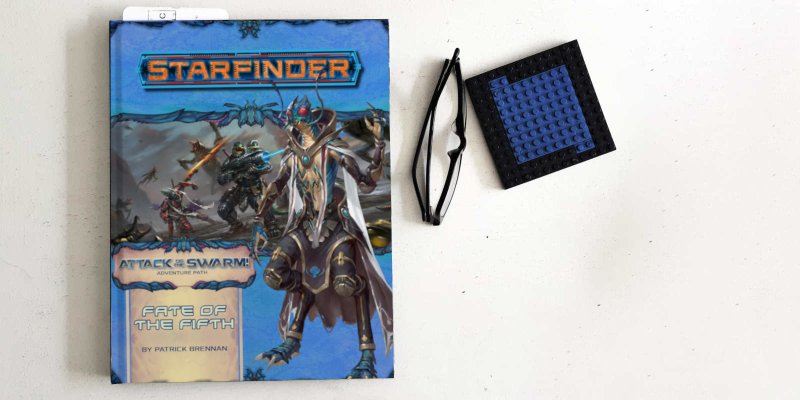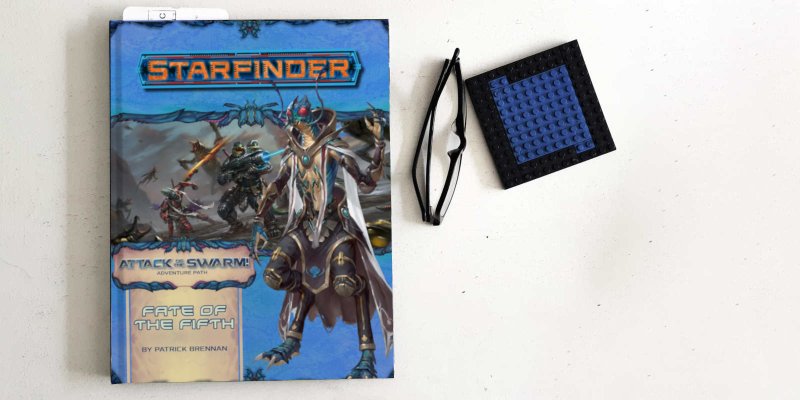Do you dread being caught diceless when someone unexpectedly proposes a game? Are business meetings fraught with anxiety for fear of a client suddenly asking you to teach them D&D, but then realising you didn't bring a d20? Is your home life suffering because you're accusing your loved ones of steal...
The term "roleplaying" has been long an overloaded term. You can play a Lone Wolf or Fighting Fantasy game book, or a campaign of solo Tunnel & Trolls adventures, or play an RPG with a gaming group, or a computer game, and we call it "roleplaying". Just as people think of "D&D" when they hear...
About half-way through the lifespan of Dragon and Dungeon magazines, a company called Paizo was commissioned to take over publication. After the Dungeon and Dragon and Polyhedron magazines were discontinued, Paizo obstinantly continued to publish adventures for D&D. And from magazine t...
In Pathfinder and Tales of the Valiant and similar fantasy roleplaying games, you go on adventures to find treasure and magical items and weapons so you can go on even bigger adventures. That's meant to be exciting. But with great power comes the potential for great boredom, because when you sto...
I've written before that you can never have too many spells for roleplaying games like Pathfinder and Tales of the Valiant, and that's as true for the Game Master as it is for player characters. The problem isn't having too many spells to choose from, it's how to know what spells you have avai...
I'm reading through the Starfinder adventure path Attack of the Swarm. The second module in the series is The Last Refuge. This review may contain minor spoilers.
The previous module, Fate of the Fifth, was a punishing, non-stop chase scene. It was thrilling to read. I couldn't put it do...
I recently got the Attack of the Swarm adventure path from Humble Bundle, and I've been reading through it. The first module in the series is Fate of the Fifth. This review may contain minor spoilers.
Fate of the Fifth opens up with the players forced into a role as soldiers in the Suskillon...
Here's the thing about traps. They're the ONLY encounter in an RPG that players cannot opt out of. Once you encounter a trap, whether your character is physically trapped or you're just being blocked from progressing the story by a really hard puzzle, you basically have no choice but to deal with th...
There seems to be a lot of talk these days about character death in D&D and other roleplaying games. It seems that there's an audience that doesn't want their player character to die. Ever.
Which, admittedly, is the point of the game mechanic. If players don't care about death, then there's no poi...
In a previous post, I wrote about how tracking encumbrance made loot more "valuable" by enforcing a weight-based economy. However, tracking encumbrance can be hard. In theory, it's exclusively the responsibility of each player, but if the game master (GM) doesn't announce the weight of each item t...
Everybody has their own tolerance levels for how much paperwork in an RPG they feel is fun. For some people, updating their character sheet is a milestone system for their character. It's as much a part of the game as NPC interactions, decisions, strategy, solving puzzles, and so on. For others, a c...
I track the passage of time in my RPGs, and so should you, and it's actually easy. This blog post tells you how.
What you need
A deck of cards. If possible, use Pathfinder or Starfinder cards, or something similar. You'll see why.
How to do it
Set your deck of cards on the table. When an...
Before I knew it was supposed to be hard to do it, I converted adventures from one RPG system to another on a regular basis. It started innocently enough. I'd play in someone's Tunnels & Trolls campaign, and then go home and run the same story as a D&D adventure for my friends. It never occurred t...
A unique thing about tabletop roleplaying games is that when you buy them, you're mostly just buying rules. Some rulebooks also describe in-game items, and some even come with a sample adventure tacked on at the end, but the thing you carry from game to game is a book on how to play, not what to p...
Like all tabletop games, an RPG is a group effort. As long as everyone playing the game is determined to have fun, the game goes as well as it needs to go. You might not get all the rules "right", but the game master makes rulings that work well enough for that game session, and everyone has fun. Pr...
Are you thinking about playing D&D or Pathfinder or some other roleplaying game (RPG) like Starfinder, Call of Cthulhu, or similar? Of course you need players, and one player designated as the person (usually called the "Dungeon Master" or the "game master") to "play" the game world itself. The best...















